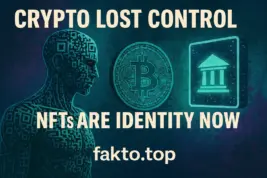Crypto Is Having an Identity Crisis — And We’re All In It
Crypto isn’t just down bad — it’s existentially confused. What started as a rebellion against banks has morphed into a playground for hedge funds, bots, and meme cults. Bitcoin is being weaponized by governments, AI is trading your bags without asking, and NFTs are back — not as investments, but as identity flexes. The lines between finance, culture, and politics are gone. And no one’s really in charge. That’s the real story.

Bitcoin as a Political Weapon
From Freedom to Leverage
It started as a whisper. Then a tweet. Then a full-blown debate on Capitol Hill. Can Bitcoin be used as a geopolitical tool? Apparently yes. After the recent election cycle flipped the script, some U.S. lawmakers are floating the idea of BTC as a strategic reserve — not just for hedging inflation, but for hedging influence.
The irony? Bitcoin was born to escape politics. Now it’s being dragged into the very thing it tried to dodge. BlackRock’s Larry Fink called it “digital gold with teeth.” Others — like ex-CIA analyst Marla K. — warn it’s “a decentralized Trojan horse.”
In practice, we’re seeing countries like El Salvador doubling down, while others (Iran, Russia) allegedly use crypto rails to bypass sanctions. The ethics? Murky. The implications? Huge. If Bitcoin becomes a weapon, what happens to neutrality? What happens to trust?
This isn’t just about price action. It’s about power. And the market knows it — volatility spikes every time a senator opens their mouth.
AI Is Trading Your Bags — And It Doesn’t Care
Autonomous Agents, Zero Accountability
AI is now trading crypto. Not assisting. Not advising. Actually trading. Autonomous agents built on GPT-like models are managing DeFi portfolios, executing arbitrage, and even voting in DAOs. And they’re doing it fast. Too fast.

The problem? No one knows who’s responsible when things go wrong — not the devs, not the DAO, not the user who clicked “approve.” It’s a black box with a wallet. And it’s scalping you while you sleep.
Some say it’s the future of finance. Others call it “algorithmic nihilism.” We call it: terrifyingly efficient. The bots don’t care about your thesis. They don’t care about your community. They care about edge. And they’re getting better.
One fund allegedly deployed a fully autonomous AI trader nicknamed “Ghost” — it made 17% in a week, then nuked itself chasing a fake pump. No one knows who built it. No one knows who lost the money. Welcome to the future.
| Aspect | Old Crypto (2015–2020) | New Crypto (2021–2025) |
|---|---|---|
| Purpose | Financial freedom, anti-bank | Identity, culture, geopolitical leverage |
| Main Players | Cypherpunks, devs, libertarians | Hedge funds, bots, Gen Z, brands |
| Narrative | “Be your own bank” | “Flex your JPEG, trust the bot” |
| Tech Focus | Blockchain, decentralization | AI agents, tokenized assets |
| NFT Meaning | Digital ownership, speculation | Social signal, tribal badge (AbsMouseism!) |
| Governance | Community voting, open-source ethos | DAO whales, corporate proxies |
| Risk Perception | Volatility, scams | Identity loss, algorithmic control |
| Emotional Tone | Hopeful, rebellious | Fragmented, ironic, anxious |
NFTs Are Back — But Not for the Reason You Think
From JPEGs to Digital Identity
Forget floor prices. Forget flipping. NFTs are mutating — again. This time, it’s not about profit. It’s about presence. Pudgy Penguins, Milady, Azuki — they’re not assets, they’re avatars. People wear them like digital skin. It’s weird. It’s real.
In Discords and X threads, your PFP says more than your bio. It’s your tribe, your mood, your politics. And yes, your status. The flex isn’t the price — it’s the vibe. That’s why AbsMouseism is gaining traction: surreal, chaotic, untradeable. It’s not about value. It’s about signal.
We’re seeing a shift from speculation to self-expression. From “what’s it worth?” to “what does it say about me?” That’s culture. And it’s sticky.
Even brands are catching on. Nike, Starbucks, Reddit — they’re not selling NFTs. They’re selling belonging. And it’s working.
DeFi Is Getting Colonized — And Nobody’s Talking About It
TradFi Invasion, Decentralization Erosion
DeFi was supposed to be the answer. No banks. No middlemen. Just code and community. But now? TradFi is moving in. Tokenized treasuries, real-world assets, KYC protocols — it’s starting to look like Wall Street with a MetaMask.
BlackRock, JPMorgan, Citi — they’re not just watching. They’re building. And they’re doing it quietly. Some DAOs are already majority-owned by institutional whales. Governance votes are skewed. Liquidity is centralized. The dream is cracking.
Is it bad? Depends who you ask. Some say it’s maturity. Others say it’s betrayal. We say: it’s complicated. The rails are still open. But the trains are getting corporate.
And the worst part? Most users don’t even notice. They’re farming yield, chasing airdrops, vibing in Telegram. Meanwhile, the architecture is shifting under their feet.
So What Now?
Crypto Needs a Mirror, Not a Roadmap
This isn’t just a bear market. It’s a reckoning. Crypto is being pulled in every direction — by politics, by AI, by culture, by capital. And it’s losing its center. Maybe that’s okay. Maybe that’s evolution.
But if we don’t ask the hard questions — about identity, ethics, power — we’ll wake up in a system we didn’t choose. Built by bots. Owned by banks. Masked as freedom.
So yeah, maybe it’s time to stop chasing pumps and start chasing meaning. Crypto isn’t dead. It’s just confused. And maybe — just maybe — that’s the most human thing about it.